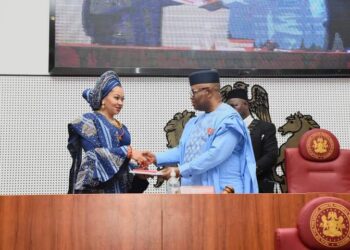A political pressure group, Action Collective, has called on Senate President Godswill Akpabio to directly address concerns raised by Senator Natasha Akpoti-Uduaghan of Kogi Central regarding her alleged restriction from speaking on the Senate floor.
The group said the issue must not be dismissed, as both Nigerians and the international community are closely monitoring the unfolding developments.
A statement released on Sunday, signed by its National Coordinator, Mr. Teddy Onyejuwe, Action Collective criticised what it described as attempts to sidestep the core issue by focusing on political maneuvering.
The group insisted that the Senate President must provide a clear response rather than using his authority to stifle dissenting voices within the legislative chamber.
“The claim by Senator Akpoti-Uduaghan that she was denied the opportunity to speak in the Senate is deeply troubling. Any attempt to silence a female legislator would set a dangerous precedent.”
“Nigerians and the world are watching. The Senate must address this matter with the seriousness it deserves instead of diverting attention,” Onyejuwe stated
Action Collective further urged the leadership of the Senate to ensure fairness and transparency in addressing the allegations, warning that any perceived suppression of voices could significantly damage the institution’s credibility.
The group stated that failure to tackle the issue openly would raise questions about the Senate’s commitment to democratic principles and gender inclusivity in governance.
“The integrity of the Senate is at stake,” the statement continued. “This matter goes beyond partisan politics; it speaks to Nigeria’s commitment to justice, gender equality, and the protection of all voices within our democratic framework.”
The group also called on civil rights organisations, women’s advocacy groups, and international observers to remain vigilant and demand accountability from Nigeria’s legislative leadership.
According to Action Collective, an impartial resolution to the issue is essential to maintaining public trust in the Senate’s ability to function as a representative institution.
With public scrutiny intensifying and pressure mounting from various quarters, the case has heightened tensions within the Senate.
Political analysts suggest that how the Senate leadership handles the situation could have broader implications for legislative independence and the perception of Nigeria’s commitment to gender parity in governance.
As the calls for clarity and fairness grow louder, observers await an official response from the Senate President, who has yet to make a direct statement addressing the concerns raised by Senator Akpoti-Uduaghan.
The coming days may prove crucial in determining how the upper legislative chamber navigates the issue, balancing political considerations with the fundamental principles of transparency and democratic fairness.
